高考英语听力成绩提高的六大关键
- 格式:docx
- 大小:14.77 KB
- 文档页数:3
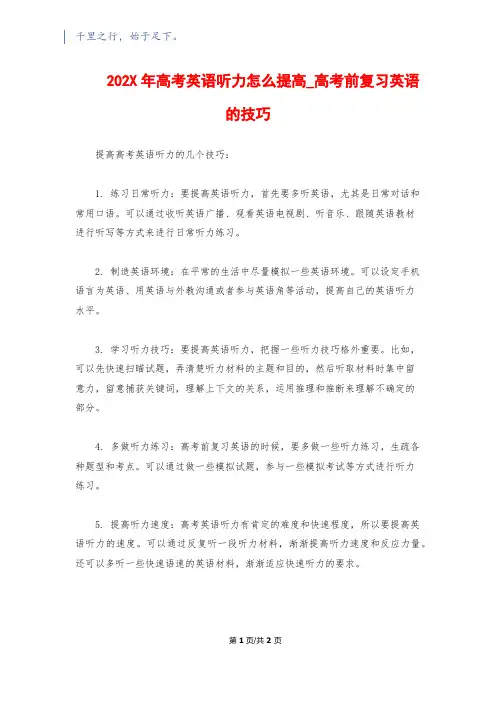
千里之行,始于足下。
202X年高考英语听力怎么提高_高考前复习英语的技巧提高高考英语听力的几个技巧:1. 练习日常听力:要提高英语听力,首先要多听英语,尤其是日常对话和常用口语。
可以通过收听英语广播、观看英语电视剧、听音乐、跟随英语教材进行听写等方式来进行日常听力练习。
2. 制造英语环境:在平常的生活中尽量模拟一些英语环境。
可以设定手机语言为英语、用英语与外教沟通或者参与英语角等活动,提高自己的英语听力水平。
3. 学习听力技巧:要提高英语听力,把握一些听力技巧格外重要。
比如,可以先快速扫瞄试题,弄清楚听力材料的主题和目的,然后听取材料时集中留意力,留意捕获关键词,理解上下文的关系,运用推理和推断来理解不确定的部分。
4. 多做听力练习:高考前复习英语的时候,要多做一些听力练习,生疏各种题型和考点。
可以通过做一些模拟试题,参与一些模拟考试等方式进行听力练习。
5. 提高听力速度:高考英语听力有肯定的难度和快速程度,所以要提高英语听力的速度。
可以通过反复听一段听力材料,渐渐提高听力速度和反应力量。
还可以多听一些快速语速的英语材料,渐渐适应快速听力的要求。
第1页/共2页锲而不舍,金石可镂。
6. 留意听力材料的多样性:高考英语听力考察的材料形式多样,包括对话、讲座、广播、广告等。
在复习时要留意接触和生疏各种形式的听力材料,以提高自己对不同材料的理解和适应力量。
7. 整合多种资源:除了教材中的听力材料,还应当整合多种资源进行听力练习。
可以利用一些在线学习平台或者手机APP进行听力练习,参与一些英语角活动,找一些外教进行口语训练等。
8. 错误分析与反思:在做完一份听力试题后,要进行错误分析和反思。
找出自己的错误缘由,并查找改进方法。
可以记录下自己在听力中简洁犯的错误类型,准时订正。
总之,要提高高考英语听力水平,需要在平常多加练习,留意听力技巧和速度的提高,多样化听力材料的接触,以及适时进行错误分析和改进。
只有不断地积累和训练,才能提升自己的英语听力力量,取得高分。
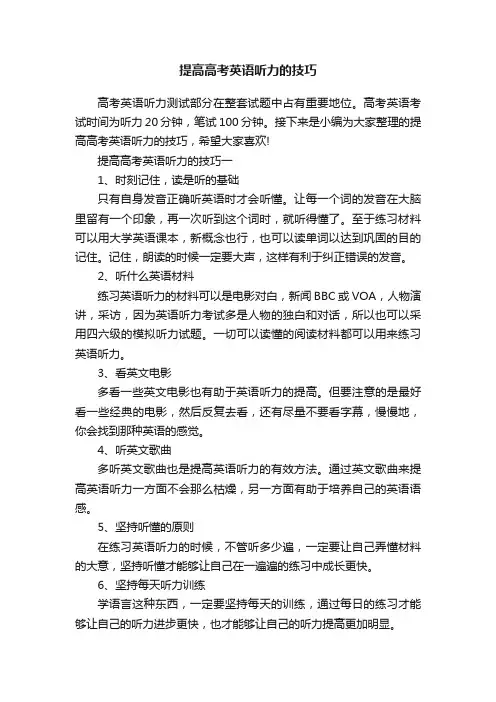
提高高考英语听力的技巧高考英语听力测试部分在整套试题中占有重要地位。
高考英语考试时间为听力20分钟,笔试100分钟。
接下来是小编为大家整理的提高高考英语听力的技巧,希望大家喜欢!提高高考英语听力的技巧一1、时刻记住,读是听的基础只有自身发音正确听英语时才会听懂。
让每一个词的发音在大脑里留有一个印象,再一次听到这个词时,就听得懂了。
至于练习材料可以用大学英语课本,新概念也行,也可以读单词以达到巩固的目的记住。
记住,朗读的时候一定要大声,这样有利于纠正错误的发音。
2、听什么英语材料练习英语听力的材料可以是电影对白,新闻BBC或VOA,人物演讲,采访,因为英语听力考试多是人物的独白和对话,所以也可以采用四六级的模拟听力试题。
一切可以读懂的阅读材料都可以用来练习英语听力。
3、看英文电影多看一些英文电影也有助于英语听力的提高。
但要注意的是最好看一些经典的电影,然后反复去看,还有尽量不要看字幕,慢慢地,你会找到那种英语的感觉。
4、听英文歌曲多听英文歌曲也是提高英语听力的有效方法。
通过英文歌曲来提高英语听力一方面不会那么枯燥,另一方面有助于培养自己的英语语感。
5、坚持听懂的原则在练习英语听力的时候,不管听多少遍,一定要让自己弄懂材料的大意,坚持听懂才能够让自己在一遍遍的练习中成长更快。
6、坚持每天听力训练学语言这种东西,一定要坚持每天的训练,通过每日的练习才能够让自己的听力进步更快,也才能够让自己的听力提高更加明显。
提高高考英语听力的技巧二很多人认为想要提高英语听力,就要多练习英语听力材料。
其实,这可以说是一个小误区。
因为我们的学习环境导致我们只注重单一的听力练习是错误的。
所以,想要提高英语听力水平,应该把阅读和听力练习同时进行。
对于英语听力来说,读是听的基础。
想要听懂英语听力,要先能读出来。
其实这是有一定的道理的,在读的过程中,其实就是刺激大脑来强化记忆的过程。
所以,想要提高英语听力可以养成大声朗读的好习惯。
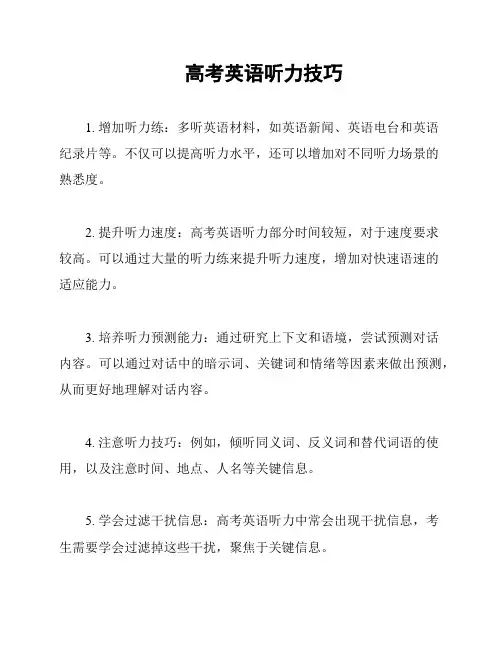
高考英语听力技巧
1. 增加听力练:多听英语材料,如英语新闻、英语电台和英语
纪录片等。
不仅可以提高听力水平,还可以增加对不同听力场景的
熟悉度。
2. 提升听力速度:高考英语听力部分时间较短,对于速度要求
较高。
可以通过大量的听力练来提升听力速度,增加对快速语速的
适应能力。
3. 培养听力预测能力:通过研究上下文和语境,尝试预测对话
内容。
可以通过对话中的暗示词、关键词和情绪等因素来做出预测,从而更好地理解对话内容。
4. 注意听力技巧:例如,倾听同义词、反义词和替代词语的使用,以及注意时间、地点、人名等关键信息。
5. 学会过滤干扰信息:高考英语听力中常会出现干扰信息,考
生需要学会过滤掉这些干扰,聚焦于关键信息。
6. 注意听力顺序:英语听力考试一般会按照对话的发生顺序来排列题目,考生可以根据对话的逻辑顺序来推测答案。
7. 多做模拟测试:高考前可以多做一些模拟测试,熟悉高考听力的题型和要求,提高应对考试的能力。
总之,提高高考英语听力技巧需要持之以恒的练习。
通过增加听力练习、提升听力速度、培养听力预测能力等方法,可以有效提高高考英语听力水平,更好地应对考试。
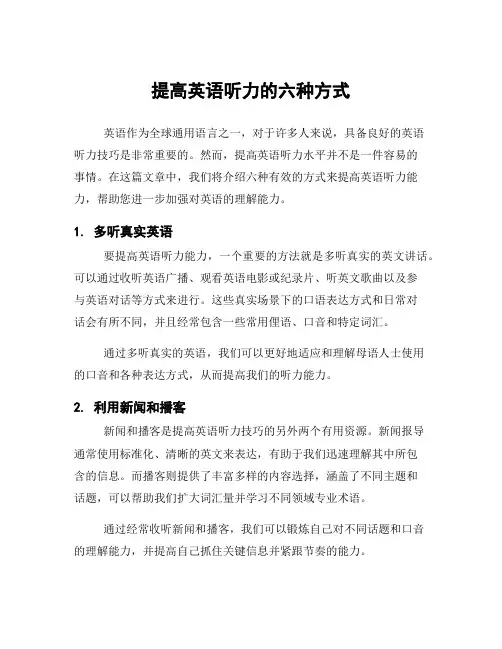
提高英语听力的六种方式英语作为全球通用语言之一,对于许多人来说,具备良好的英语听力技巧是非常重要的。
然而,提高英语听力水平并不是一件容易的事情。
在这篇文章中,我们将介绍六种有效的方式来提高英语听力能力,帮助您进一步加强对英语的理解能力。
1. 多听真实英语要提高英语听力能力,一个重要的方法就是多听真实的英文讲话。
可以通过收听英语广播、观看英语电影或纪录片、听英文歌曲以及参与英语对话等方式来进行。
这些真实场景下的口语表达方式和日常对话会有所不同,并且经常包含一些常用俚语、口音和特定词汇。
通过多听真实的英语,我们可以更好地适应和理解母语人士使用的口音和各种表达方式,从而提高我们的听力能力。
2. 利用新闻和播客新闻和播客是提高英语听力技巧的另外两个有用资源。
新闻报导通常使用标准化、清晰的英文来表达,有助于我们迅速理解其中所包含的信息。
而播客则提供了丰富多样的内容选择,涵盖了不同主题和话题,可以帮助我们扩大词汇量并学习不同领域专业术语。
通过经常收听新闻和播客,我们可以锻炼自己对不同话题和口音的理解能力,并提高自己抓住关键信息并紧跟节奏的能力。
3. 阅读与听读结合阅读与听读相结合是进一步提高英语听力水平的有效方法之一。
通过阅读文章时,可以在心理上形成预期,并尝试在读之前推测内容。
然后,在收听相应的音频材料时,可以验证自己的推测是否正确。
这种方式能够帮助我们将书面文字与口头表达相联系,培养我们对单词和短语在不同情景中(包括口头表达)使用时的理解能力。
4. 倾听背景材料倾听背景材料是指在了解特定主题或话题之前预先放置相关材料,了解相关背景知识,并尝试从材料中收集相关细节。
这种方法可以帮助我们更好地适应特定领域的术语和内容,并且加深对相关话题的理解。
例如,在学习关于环境保护的主题时,我们可以首先阅读与环境类似内容相关的文章或书籍,并试着找到其中的专有名词、主要观点等。
然后,在收听与环境保护相关的对话或演讲时,我们将更容易理解其中涉及到的词汇和概念。
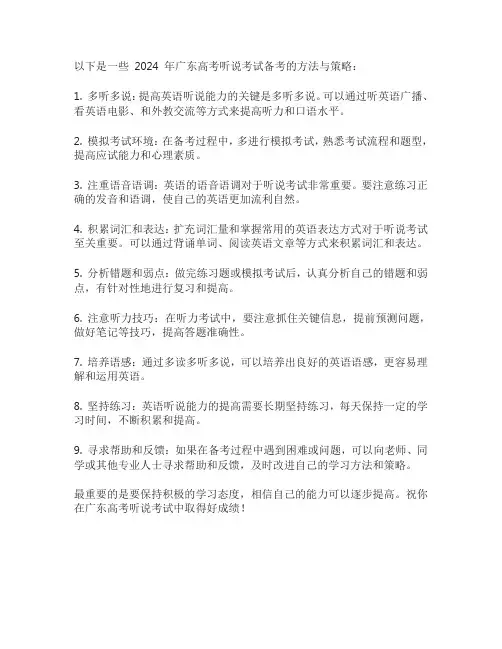
以下是一些2024 年广东高考听说考试备考的方法与策略:
1. 多听多说:提高英语听说能力的关键是多听多说。
可以通过听英语广播、看英语电影、和外教交流等方式来提高听力和口语水平。
2. 模拟考试环境:在备考过程中,多进行模拟考试,熟悉考试流程和题型,提高应试能力和心理素质。
3. 注重语音语调:英语的语音语调对于听说考试非常重要。
要注意练习正确的发音和语调,使自己的英语更加流利自然。
4. 积累词汇和表达:扩充词汇量和掌握常用的英语表达方式对于听说考试至关重要。
可以通过背诵单词、阅读英语文章等方式来积累词汇和表达。
5. 分析错题和弱点:做完练习题或模拟考试后,认真分析自己的错题和弱点,有针对性地进行复习和提高。
6. 注意听力技巧:在听力考试中,要注意抓住关键信息,提前预测问题,做好笔记等技巧,提高答题准确性。
7. 培养语感:通过多读多听多说,可以培养出良好的英语语感,更容易理解和运用英语。
8. 坚持练习:英语听说能力的提高需要长期坚持练习,每天保持一定的学习时间,不断积累和提高。
9. 寻求帮助和反馈:如果在备考过程中遇到困难或问题,可以向老师、同学或其他专业人士寻求帮助和反馈,及时改进自己的学习方法和策略。
最重要的是要保持积极的学习态度,相信自己的能力可以逐步提高。
祝你在广东高考听说考试中取得好成绩!。
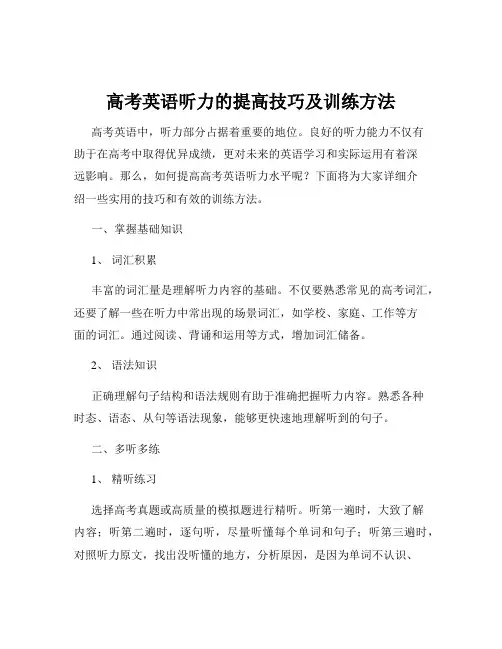
高考英语听力的提高技巧及训练方法高考英语中,听力部分占据着重要的地位。
良好的听力能力不仅有助于在高考中取得优异成绩,更对未来的英语学习和实际运用有着深远影响。
那么,如何提高高考英语听力水平呢?下面将为大家详细介绍一些实用的技巧和有效的训练方法。
一、掌握基础知识1、词汇积累丰富的词汇量是理解听力内容的基础。
不仅要熟悉常见的高考词汇,还要了解一些在听力中常出现的场景词汇,如学校、家庭、工作等方面的词汇。
通过阅读、背诵和运用等方式,增加词汇储备。
2、语法知识正确理解句子结构和语法规则有助于准确把握听力内容。
熟悉各种时态、语态、从句等语法现象,能够更快速地理解听到的句子。
二、多听多练1、精听练习选择高考真题或高质量的模拟题进行精听。
听第一遍时,大致了解内容;听第二遍时,逐句听,尽量听懂每个单词和句子;听第三遍时,对照听力原文,找出没听懂的地方,分析原因,是因为单词不认识、发音不准确还是语法不熟悉。
然后反复听这些没听懂的部分,直到完全听懂。
2、泛听练习利用课余时间进行泛听,如听英语广播、看英语电影、听英语歌曲等。
泛听的目的是培养英语语感,熟悉英语的语音、语调、语速。
三、培养听力技巧1、预测内容在听力开始前,迅速浏览题目和选项,根据所给信息预测听力内容的主题和可能涉及的问题。
这样在听的过程中就能更有针对性地捕捉关键信息。
2、抓关键词在听力过程中,要善于抓住关键词,如人名、地名、时间、数字、转折词等。
这些关键词往往是理解听力内容的关键。
3、注意语气和语调说话者的语气和语调可以传达很多信息,如肯定、否定、疑问、惊讶等。
通过注意语气和语调,可以更好地理解说话者的意图。
四、提高自身发音1、模仿标准发音通过模仿英语原声,如听力材料中的录音、英语电影中的对白等,纠正自己的发音错误,提高发音的准确性。
2、朗读练习每天坚持朗读英语文章,不仅可以提高口语表达能力,还能增强对英语语音、语调的敏感度,从而有助于提高听力水平。
五、创造英语环境1、用英语交流在日常生活中,尽量创造用英语交流的机会,如与同学用英语讨论问题、参加英语角等。
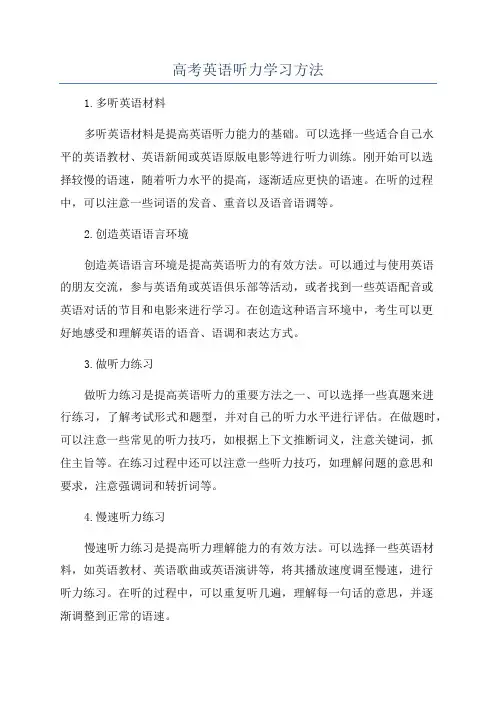
高考英语听力学习方法1.多听英语材料多听英语材料是提高英语听力能力的基础。
可以选择一些适合自己水平的英语教材、英语新闻或英语原版电影等进行听力训练。
刚开始可以选择较慢的语速,随着听力水平的提高,逐渐适应更快的语速。
在听的过程中,可以注意一些词语的发音、重音以及语音语调等。
2.创造英语语言环境创造英语语言环境是提高英语听力的有效方法。
可以通过与使用英语的朋友交流,参与英语角或英语俱乐部等活动,或者找到一些英语配音或英语对话的节目和电影来进行学习。
在创造这种语言环境中,考生可以更好地感受和理解英语的语音、语调和表达方式。
3.做听力练习做听力练习是提高英语听力的重要方法之一、可以选择一些真题来进行练习,了解考试形式和题型,并对自己的听力水平进行评估。
在做题时,可以注意一些常见的听力技巧,如根据上下文推断词义,注意关键词,抓住主旨等。
在练习过程中还可以注意一些听力技巧,如理解问题的意思和要求,注意强调词和转折词等。
4.慢速听力练习慢速听力练习是提高听力理解能力的有效方法。
可以选择一些英语材料,如英语教材、英语歌曲或英语演讲等,将其播放速度调至慢速,进行听力练习。
在听的过程中,可以重复听几遍,理解每一句话的意思,并逐渐调整到正常的语速。
5.多做听力笔记做听力笔记是提高听力效果的有效方法。
可以在听的过程中做一些简单的笔记,如关键词、关键句或主旨等,帮助记忆和理解英语材料的内容。
在做题时,还可以在听力材料上做一些标记,帮助快速找到相关信息和答案。
做听力笔记不仅可以提高听力能力,还可以提高笔记和整理信息的能力。
除了以上的学习方法,还有一些小技巧也可以帮助考生提高英语听力能力。
比如,多听一些有针对性的听力材料,如科技类、社会类、经济类等各种题材的英语材料,帮助拓宽知识面和词汇量;注意提高对非母语人士的英语理解能力,通过听一些英语为非母语人士的演讲或访谈等,帮助理解不同口音和语言习惯的英语;还可以利用一些在线或手机APP的听力资源来进行听力练习,如有道听力、扇贝听力等,提供不同难度和题型的听力材料。
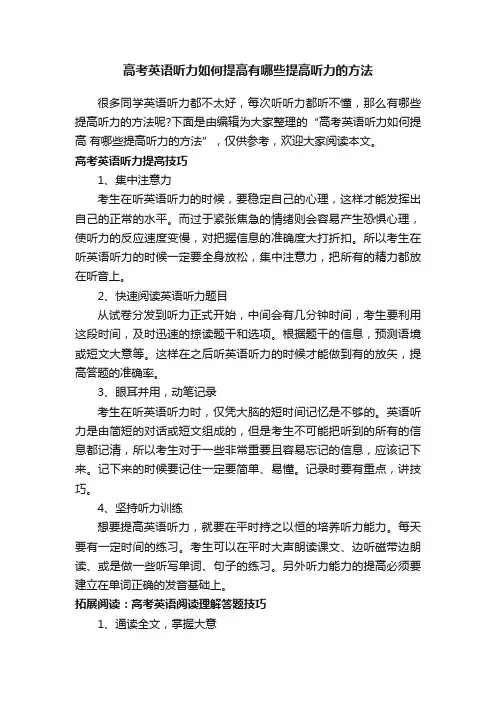
高考英语听力如何提高有哪些提高听力的方法很多同学英语听力都不太好,每次听听力都听不懂,那么有哪些提高听力的方法呢?下面是由编辑为大家整理的“高考英语听力如何提高有哪些提高听力的方法”,仅供参考,欢迎大家阅读本文。
高考英语听力提高技巧1、集中注意力考生在听英语听力的时候,要稳定自己的心理,这样才能发挥出自己的正常的水平。
而过于紧张焦急的情绪则会容易产生恐惧心理,使听力的反应速度变慢,对把握信息的准确度大打折扣。
所以考生在听英语听力的时候一定要全身放松,集中注意力,把所有的精力都放在听音上。
2、快速阅读英语听力题目从试卷分发到听力正式开始,中间会有几分钟时间,考生要利用这段时间,及时迅速的掠读题干和选项。
根据题干的信息,预测语境或短文大意等。
这样在之后听英语听力的时候才能做到有的放矢,提高答题的准确率。
3、眼耳并用,动笔记录考生在听英语听力时,仅凭大脑的短时间记忆是不够的。
英语听力是由简短的对话或短文组成的,但是考生不可能把听到的所有的信息都记清,所以考生对于一些非常重要且容易忘记的信息,应该记下来。
记下来的时候要记住一定要简单、易懂。
记录时要有重点,讲技巧。
4、坚持听力训练想要提高英语听力,就要在平时持之以恒的培养听力能力。
每天要有一定时间的练习。
考生可以在平时大声朗读课文、边听磁带边朗读、或是做一些听写单词、句子的练习。
另外听力能力的提高必须要建立在单词正确的发音基础上。
拓展阅读:高考英语阅读理解答题技巧1、通读全文,掌握大意做阅读理解题一定要学会通过,从整体上理解短文的大意及中心思想,领会出题人的意图。
切忌人为地将短文搞得支离破碎,逐词逐句地去感知材料,看一句或几句做一个题目,这样会影响答题的正确率。
但是对于一些长句和难句要作语法分析,以便掌握短文的大意和每个句子的确切含义。
短文的开头和结尾往往是全文内容的概括,对理解、推理都会有很大的帮助。
2、细审题意,获取信息认真审阅文后的理解题。
在审题时要弄清楚试题问的是细节(如人物、时间、地点)。
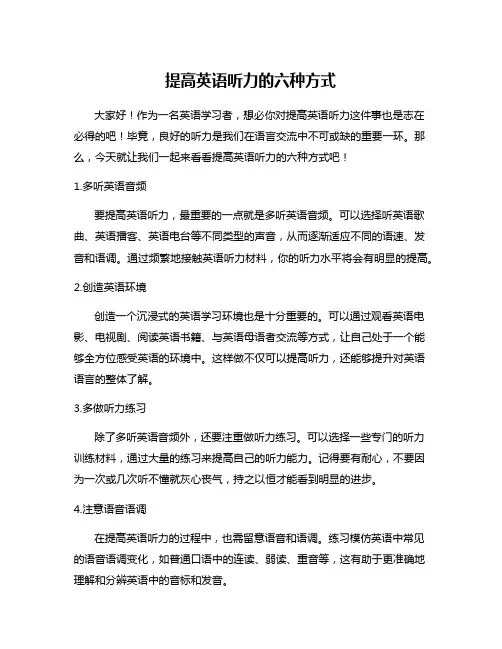
提高英语听力的六种方式大家好!作为一名英语学习者,想必你对提高英语听力这件事也是志在必得的吧!毕竟,良好的听力是我们在语言交流中不可或缺的重要一环。
那么,今天就让我们一起来看看提高英语听力的六种方式吧!1.多听英语音频要提高英语听力,最重要的一点就是多听英语音频。
可以选择听英语歌曲、英语播客、英语电台等不同类型的声音,从而逐渐适应不同的语速、发音和语调。
通过频繁地接触英语听力材料,你的听力水平将会有明显的提高。
2.创造英语环境创造一个沉浸式的英语学习环境也是十分重要的。
可以通过观看英语电影、电视剧、阅读英语书籍、与英语母语者交流等方式,让自己处于一个能够全方位感受英语的环境中。
这样做不仅可以提高听力,还能够提升对英语语言的整体了解。
3.多做听力练习除了多听英语音频外,还要注重做听力练习。
可以选择一些专门的听力训练材料,通过大量的练习来提高自己的听力能力。
记得要有耐心,不要因为一次或几次听不懂就灰心丧气,持之以恒才能看到明显的进步。
4.注意语音语调在提高英语听力的过程中,也需留意语音和语调。
练习模仿英语中常见的语音语调变化,如普通口语中的连读、弱读、重音等,这有助于更准确地理解和分辨英语中的音标和发音。
5.听力速度适应针对不同的听力材料,可能会有快速的新闻报道、慢速的讲座等,要学会根据不同场景适应不同的听力速度。
逐渐提高自己的听力速度,从而更好地理解各种类型的英语内容。
6.多元化的听力资源要多样化地获取听力资源。
除了传统的听力材料外,还可以尝试听一些英语广播、纪录片、访谈等不同类型的内容,拓宽自己的听力范围,锻炼听力的适应能力和理解能力。
提高英语听力需要多方面的努力和坚持不懈。
通过多听、创造英语环境、做练习、注意语音语调、适应听力速度和获取多元化资源等方式,相信你的英语听力将会有明显的改善!现在就开始行动吧,相信你一定能提高自己的英语听力水平,与更广阔的世界进行更畅快的交流和沟通!提高英语听力需要持之以恒地进行多维度、多形式的练习和学习,只有通过不断的努力和积累,我们的英语听力水平才能得到长足的提高!加油吧,朋友们!。
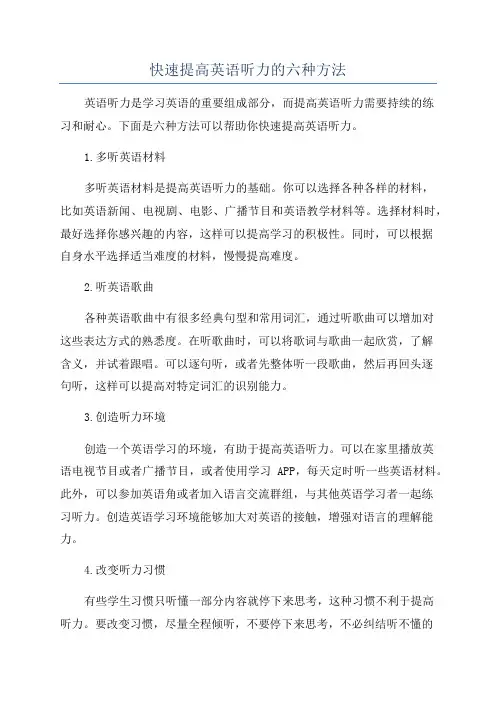
快速提高英语听力的六种方法英语听力是学习英语的重要组成部分,而提高英语听力需要持续的练习和耐心。
下面是六种方法可以帮助你快速提高英语听力。
1.多听英语材料多听英语材料是提高英语听力的基础。
你可以选择各种各样的材料,比如英语新闻、电视剧、电影、广播节目和英语教学材料等。
选择材料时,最好选择你感兴趣的内容,这样可以提高学习的积极性。
同时,可以根据自身水平选择适当难度的材料,慢慢提高难度。
2.听英语歌曲各种英语歌曲中有很多经典句型和常用词汇,通过听歌曲可以增加对这些表达方式的熟悉度。
在听歌曲时,可以将歌词与歌曲一起欣赏,了解含义,并试着跟唱。
可以逐句听,或者先整体听一段歌曲,然后再回头逐句听,这样可以提高对特定词汇的识别能力。
3.创造听力环境创造一个英语学习的环境,有助于提高英语听力。
可以在家里播放英语电视节目或者广播节目,或者使用学习APP,每天定时听一些英语材料。
此外,可以参加英语角或者加入语言交流群组,与其他英语学习者一起练习听力。
创造英语学习环境能够加大对英语的接触,增强对语言的理解能力。
4.改变听力习惯有些学生习惯只听懂一部分内容就停下来思考,这种习惯不利于提高听力。
要改变习惯,尽量全程倾听,不要停下来思考,不必纠结听不懂的部分。
可以通过多次听同一段材料,逐渐提高听懂的能力。
同时,要学会用上下文推理,通过语境判断词义和句意。
5.运用辅助工具有时候,听力过快和不熟悉的词汇会成为听力障碍。
可以通过使用辅助工具来帮助提高听力。
比如,可以使用字幕功能,在看英语影片时显示英文字幕,这样可以帮助理解对话的内容。
还可以使用在线词典或者翻译软件来查阅生词和短语,以便更好地理解听到的内容。
6.练习听力技巧除了以上的方法外,还可以练习一些听力技巧,有助于提高听力效果。
例如,可以听一些短篇故事,并尝试回答问题;可以听一些有关演讲和讲座的录音,并试着记录关键信息;可以进行一些Dictation练习,听一段材料并尝试写下听到的内容。
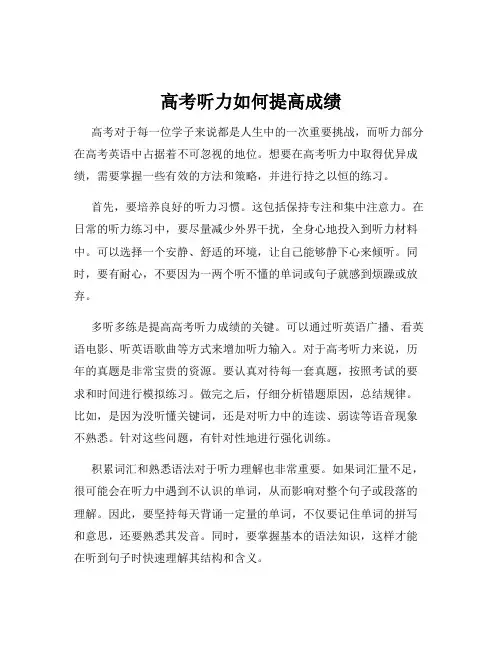
高考听力如何提高成绩高考对于每一位学子来说都是人生中的一次重要挑战,而听力部分在高考英语中占据着不可忽视的地位。
想要在高考听力中取得优异成绩,需要掌握一些有效的方法和策略,并进行持之以恒的练习。
首先,要培养良好的听力习惯。
这包括保持专注和集中注意力。
在日常的听力练习中,要尽量减少外界干扰,全身心地投入到听力材料中。
可以选择一个安静、舒适的环境,让自己能够静下心来倾听。
同时,要有耐心,不要因为一两个听不懂的单词或句子就感到烦躁或放弃。
多听多练是提高高考听力成绩的关键。
可以通过听英语广播、看英语电影、听英语歌曲等方式来增加听力输入。
对于高考听力来说,历年的真题是非常宝贵的资源。
要认真对待每一套真题,按照考试的要求和时间进行模拟练习。
做完之后,仔细分析错题原因,总结规律。
比如,是因为没听懂关键词,还是对听力中的连读、弱读等语音现象不熟悉。
针对这些问题,有针对性地进行强化训练。
积累词汇和熟悉语法对于听力理解也非常重要。
如果词汇量不足,很可能会在听力中遇到不认识的单词,从而影响对整个句子或段落的理解。
因此,要坚持每天背诵一定量的单词,不仅要记住单词的拼写和意思,还要熟悉其发音。
同时,要掌握基本的语法知识,这样才能在听到句子时快速理解其结构和含义。
注重语音语调的学习。
英语中的语音语调变化丰富,不同的语调可能表达不同的意思。
要通过模仿标准的英语发音,来提高自己的语音语调敏感度。
可以跟着录音或者英语原声材料进行跟读练习,注意单词的重读、连读、弱读以及句子的升降调。
提高听力速度也是必不可少的。
可以逐渐增加听力材料的难度和语速,让自己适应较快的听力节奏。
在练习时,可以尝试不看听力原文,先听几遍,努力理解大意,然后再对照原文,查看自己理解的偏差。
另外,养成提前预习的习惯也有助于提高听力成绩。
在进行听力练习或考试前,快速浏览题目和选项,了解主题和可能涉及的内容,这样在听的过程中就能更有针对性地捕捉关键信息。
在平时的学习中,还可以和同学一起进行听力练习和讨论。
提高英语听力的六种方式英语听力是语言学习中至关重要的一环,良好的听力能力不仅有助于我们更好地理解英语,还可以提升我们的口语表达和交流能力。
那么,如何有效提高英语听力呢?接下来,就为大家分享六种提高英语听力的方法。
1.多听英语广播和播客英语广播和播客是提高听力的绝佳资源,通过频繁聆听,不仅可以熟悉不同的发音和语速,还能提升对于英语听力的理解能力。
可以选择那些内容感兴趣的节目,如新闻、谈话性节目或英语教学类节目,每天抽出一定时间专心倾听,对提高听力水平大有裨益。
2.观看英语影视剧和纪录片通过观看英语影视剧和纪录片,不仅可以锻炼听力,还能感受英语的真实运用场景,更好地理解语境和文化背景。
可以先从简单的剧集开始,逐渐提高难度,同时可以开启字幕辅助,逐渐过渡到不看字幕的阶段。
3.利用英语学习APP现如今,有许多优质的英语学习APP可以帮助提高听力。
这些APP包含了丰富的听力练习材料,例如听力测试、实时对话练习等,通过与这些应用的互动,可以有效地加强听力训练,提高听力水平。
4.组织英语学习小组与他人一起学习英语,可以相互交流、讨论,还能获得及时的反馈。
可以参加英语角、线上学习社区或组建线下学习小组,大家共同练习听力,相互鼓励,共同进步。
5.跟读和模仿跟读是提高英语听力的有效方法之一,可以选择一些优秀的英文演讲或短文,反复听、模仿其中的语音语调、语速,帮助提高自己的语音表达能力。
通过不断练习,逐渐提高对于英语的理解和表达能力。
6.创造英语环境营造一个英语环境对于提高听力同样至关重要。
可以将手机、电脑等设备语言设置为英语,多和外国友人交流,或者参加英语活动,使自己处于一个需要使用英语的环境中,这样能够激发学习动力,加速听力的提高。
提高英语听力需要持之以恒的努力和坚持不懈的训练,希望以上分享的六种方法能够帮助大家有效提升英语听力水平,将更加流利的英语运用到生活和工作中。
提议:积极尝试这些方法,将英语听力训练融入日常生活中,坚持不懈,相信你会取得巨大进步!。
让知识带有温度。
2023年高中英语学习方法:提高听力训练的六个要诀整理高中英语学习方法:提高听力训练的六个要诀现在学习英语的人群基本上都是孩子,同学和上班族等等,虽然每一个人群的学习需求不同,但学英语的初衷一样,都是为了更好的提升自己,能够在学习中、工作中甚至在日常生活中能够流利的说英语。
下面是我为大家收集的高中英语学习方法:提高听力训练的六个要诀。
盼望可以关心大家。
第一、自身精确的发音。
自身精确地道的英语发音不能让你在听力上面无往不利,但是不精确不地道的发音肯定不能有效的解决听力问题。
而精确地道的发音往往又得之于在听力中订正自己的发音。
两者是相互进行的。
其次、阅读应与听力练习同时,同比重的进行。
许多人为提高听力把全部时间都集中在听力材料的练习上。
我确定的说,这是个错误。
我们不是生活在国外,你无论怎样营造,都不能有一个真正的外国的文化氛围在你身边,这一个已经可以说明只注意单一的听力练习是错误的。
其次,听力练习中,你接触到多少信息呢?这个信息包括词汇、语法、习惯用法、文化等等在接触材料时能够遇到的全部东西。
我敢说你听十盒磁带不及我读一本原著的信息量。
假如别人的说话内容超出了你那听得滚瓜烂熟的磁带内容,你是否有信念听懂?这可是非常自然的事情,你自己日常的说话内容,是否可以用十盒磁带来装得下来。
只要你发音正确,你在阅读时接触到的词,假如让你在听的时候遇到,许多都有可能听懂。
如果你的听力目标是第1页/共3页千里之行,始于足下。
想听什么就能听懂什么的话,阅读起到的作用更是举足轻重。
同时,假如你连在阅读中都无法读懂的句子,你在听力中能够听懂吗?我想来个总结:词汇量和语法是阅读的关键,阅读量的多少以及阅读力量的好坏打算听说力量的凹凸,而我们学习语言,又必需从听说开头。
第三、VOASpecialEnglish是很好的听力材料,但是你已经听够了,给点信念自己,听一些外国人正常语速的东西。
你不行能要求外国人用SpecialEnglish的语速说话给你听。
提升高考英语听力方法技巧1.改善听力环境:为了更好地提升听力技巧,学习者应该尽量营造一个良好的听力环境。
可以选择一个安静的地方进行听力训练,避免嘈杂的声音干扰。
另外,可以使用耳机或者音箱来提高音频的质量,以便更清晰地听到每一个音节和单词。
2.大量听英语材料:要提高听力技巧,最重要的是要大量听英语材料。
可以选择听英语新闻、英语广播、英语电视节目等各类英语资源。
这样可以提高自己的听力速度和理解能力,并且能够更好地熟悉英语的语音和语调。
3.分段听:当遇到难以理解的原文时,可以将原文分成几段并多次听写。
这样可以帮助理解较长的句子和复杂的语法结构。
4.利用英文字幕:在初期阶段,如果遇到听不懂的地方,可以尝试使用英文字幕来帮助理解。
这样可以提高对于单词的拼写和发音的准确性,并且更好地理解语句的语法结构。
5.使用辅助资料:可以利用一些听力训练资料,如练习册、CD或者网上提供的听力练习。
这些资料通常包含各种难度的听力材料,可以帮助学生提高听力技巧。
6.听力笔记:在听英语材料的过程中,可以尝试将关键信息写下来。
可以记录下来听到的重要信息、主要观点和关键词汇等。
这样可以帮助加深记忆和理解,并且在复习时更好地回顾。
7.提高词汇量:词汇是理解和学习英语听力的关键要素之一、学生可以通过背诵常用单词、阅读英语杂志和书籍、使用单词卡片等方式来扩大自己的词汇量。
掌握了足够的词汇,可以更好地理解听力材料中的单词和短语。
8.注意听力技巧:在进行听力训练时,要注意一些常见的听力技巧,如断句法、词汇辨析、语气判断等。
这些技巧可以帮助学生更好地理解听力材料,并且提高答题的准确性。
9.多练习模拟考试:模拟考试是提高听力技巧的有效方法之一、可以找一些高考英语听力的模拟题,进行练习。
这样可以适应高考听力的时间、速度和难度,提高自己的应试能力。
10.自我评估和反馈:在练习听力的过程中,可以时常对自己进行评估和反馈。
可以记录下自己的得分和答题情况,并找出自己的薄弱点和需要提高的地方。
高考英语听力如何提高高考英语中,听力部分占据着重要的地位。
对于很多考生来说,提高英语听力水平并非易事,但只要掌握正确的方法和技巧,并持之以恒地练习,就能够取得显著的进步。
一、积累词汇和语法知识词汇和语法是英语学习的基础,也是提高听力水平的关键。
丰富的词汇量能够帮助我们更好地理解听力材料中的内容,而扎实的语法知识则有助于我们准确地分析句子结构和理解句子的含义。
建议同学们制定一个合理的词汇学习计划,每天背诵一定数量的单词。
可以通过单词书、英语学习 APP 等多种方式进行记忆。
同时,要注重词汇的实际运用,通过阅读、写作等方式加深对单词的理解和记忆。
语法方面,要系统地学习英语语法知识,重点掌握时态、语态、从句等常见的语法点。
在学习过程中,要结合例句进行理解和分析,多做一些语法练习题,以巩固所学的知识。
二、多听多练提高英语听力水平最直接有效的方法就是多听多练。
可以选择听英语广播、英语电影、英语歌曲、英语有声读物等多种形式的听力材料。
在听的过程中,要注意模仿语音语调,培养语感。
对于较难的听力材料,可以先听几遍,了解大致内容,然后对照听力原文,找出自己没有听懂的地方,进行反复听和分析。
刚开始练习时,可以选择语速较慢、内容较简单的听力材料,随着听力水平的提高,逐渐增加难度。
同时,要养成每天听英语的习惯,保持对英语的敏感度。
三、精听训练精听是提高英语听力水平的重要方法之一。
选择一段适合自己水平的听力材料,如历年高考英语听力真题、模拟题等,逐句听,听完一句暂停,然后将听到的内容写下来。
如果听一遍没听懂,可以多听几遍,直到能够完整地写出句子。
听完一段材料后,对照听力原文,找出自己听错、漏听的地方,分析原因,是因为单词不认识、语法不清楚还是发音不准确等。
然后针对存在的问题进行有针对性的学习和改进。
精听训练需要花费较多的时间和精力,但效果显著。
通过精听训练,能够提高我们对单词、句子的理解能力,以及对听力内容的快速反应能力。
高中英语学习方法:提高听力训练的六个要诀高中英语学习方法:提高听力训练的六个要诀英语作为国际语言,对于很多人来说,学会它变得越来越重要。
而高中英语的学习是准备接受更高水平英语学习的关键。
在高中英语过程中,听力训练是必不可少的部分。
而提高听力训练的方法也是大家都十分关心的。
本文将分享六个有用的方法,帮助你提高听力训练的效果。
1. 提前熟悉话题在听力训练之前,可以先了解一下讲话的主题。
这可以帮助你在听的过程中更好地理解。
可以通过预读文字、图片、视频等多媒体材料,来熟悉话题。
看到对听力训练相关的词汇,也可以提前预习,增加你的自信心和流利度。
2. 注重听力过程中的语调在英语语言中,语调是十分重要的一环。
尤其是当你学习英语口语的时候。
不同语言有着不同的语调和音调。
因此,在听力训练的过程中,要多听多模仿母语人士的语调、语音。
3. 沉浸式学习语言的学习除了具备死记硬背所需要的坚持和耐力,沉浸式学习也是十分有效的学习方法。
你可以通过听广播、电视和电影等多媒体材料来提高英语听力水平。
在听的过程中,要尽可能的模仿英语母语说话者的语音、语调,不断地感受、浸入到英语语境中。
4. 多听多练听力训练一定是要多听多练的。
可以通过敲打打字练习,强化对英语语言的理解。
并且,在刚起步的时候,不要一开始就选择难度最大的音频,要先选择初级和中级的听力课程,逐渐进入更有挑战的水准。
5. 时刻保持注意力英语语言非常讲究语速和发音。
在英语的听力过程中,一些普通的单词的发音会因语境不同而有所不同。
因此,在听力训练中,时刻保持注意力非常重要。
我们要努力听懂每一个单词、短语和句子,更加学习英语的基本语法,建立对英语的理解。
6. 合理利用笔记和检查在听取过程中,我们可以将一些英语表达式、关键词或生词记下来。
这是十分有效的学习方法。
我们可以将这些笔记用于回顾和检查。
在检查的过程中,我们可以更好地理解每个单词或短语的意义,了解他们在不同语境下的用法。
以上是六个有效的高中英语学习方法:提高听力训练的要诀。
【 导语】⾼考,就是千军万马过独⽊桥,⾯对全国皆兵的⾼考⼤军,每⼀门课程都显得尤为重要。尤其是要考英语听⼒的地区,提⾼⾃⼰的英语听⼒⽔平⾄关重要。那么,⾼考如何提⾼英语听⼒成绩呢?下⾯是⽆忧考分享的相关内容,欢迎阅读参考!
⾼考如何提⾼英语听⼒成绩 第⼀、多听多练是王道 对于⾼考英语听⼒,有⼈说,听多了⾃然也就会了。所以我们要想尽快提⾼⾃⼰的英语听⼒⽔平就要多听多练习,⾄于听的素材,可以是⼀部经典的欧美电影,也可以是⼀段纯正的英⽂⼴播新闻,也可以是考试时⽤的听⼒材料。个⼈认为如果是想快速提⾼听⼒⽔平的同学,建议选择⽤能飞英语学习软件有针对性做⼀些听⼒训练,精听,复读,听写练习等等。
第⼆、临场应变是良药 虽然英语听⼒考试时候的语速不是很快,但是也还是存在⼀些难点让⼈⽆法听清楚意思,这时候就是考验⼈的临场应变能⼒了。如果⼀道题没有听清楚还想要回想的时候千万不要这样做,因为你花时间回想的时候下⼀题已经开始了,这样的结果就是你错过了两道题甚⾄更多的题。
第三、猜题能⼒是⽢霖 当你实在是没有听懂听⼒材料的时候,你要做的不是随便乱写,⽽是继续认真的审题,努⼒回想⾃⼰听到的⼀些关键字,看看有没有和题⼲有些许的重合,这样做虽然不能保证万⽆⼀失,但是也能增⼤正确的⼏率。
⾼考英语听⼒就是这么简单,保持平常⼼,保证⾜够的细⼼和耐⼼,就算是势如破⽵的⾼考也将会是志在必得。提⾼英语听⼒成绩的⽅法 1、认真对待每⼀次听⼒练习,对照听⼒原⽂,找到对听⼒答案有影响的,并且⾃⼰不清楚的单词、词组、句型加以整理,掌握常见的情景表达⽅式。
2、课后练习。如果课堂上的听⼒练习对于你来说不够,那么,可以下载⼀些英语听⼒的APP或是听⼀些新概念英语等等。
3、多说,听和说是分不开的,⾃⼰如果说的好⾃然就能听得懂别⼈说的,可以尝试和同学⽤英语多交流。也可以模仿录⾳跟着后⾯⼤声朗读。
4、考试技巧。考试时听⼒不能逐字逐句,钻⽜⾓尖。先阅览听⼒题,推测可能出现的情境。猜想答案。听得时候注意把握关键信息,动笔迅速,不要犹豫,听过就过了,不要听着下⼀道题,还想着上⼀道题。
高考英语听力成绩提高的六大关键
一、成语和习惯用法
成语和习惯用语是听力中最让人头疼的。
一方面,它们都是简单而常用的词汇,诸如dog 、cat 之类;另一方面,这些熟悉的词经过固定组合之后,往往让你不知所云。
例如be on one's ball( 谨慎小心、愉快胜任地从事某事) ,be in the air( 没有确定,悬而未决;到处传播的) 。
此外,部分短语、词汇在口语中往往有特殊的表达,也需要留心掌握,例如wanna =want to ,gonna =going to 等。
英汉有别的一些表达有些句子汉语和英语的表达很不一样,甚至截然相反。
例如下面这组对话:
You won't go shopping with her this afternoon ,will you ?
No ,I won't.( 是的,我不去)Yes ,I will.( 不,我会去的)
这个句子印在卷子上,多数同学还是能理解,但一旦放到听力中去,许多人大概一听到"No" 就理解为否定的意思,但这是中文习惯:回答针对的是对方的话语观点而非事实,因此你说对了,我就回答" 是" ,你说错了,我就回答" 否" 。
但英语的习惯则是针对对方所说的事实——只要是肯定性事实,我就回答"Yes" ;只要是否定性事实,回答就是"No" 。
这些地方往往需要格外警惕。
二、数字、日期、时间等常用表达方式
填表和填空题型中会出现有关数字、日期等的听写。
目前常见的以下词汇和表达必须注意:复杂的基数( 如35476) ;序数(10th) ;分数( one eighth 、three eighths) ;小数(0.65nought point six five) ;集合数字(1 /4 :one
quarter 、6 :half a dozen 、20 :one score) 等。
电话号码的读法,年代、日期和时间的读法,常见计量单位等,也要熟悉。
三、连读和吞音
连读和吞音是语速较快时的一种自然现象。
考研英语听力中出现的是一些比较容易识别或稍加注意就能够识别的连读。
吞音难度较大,一般不会涉及很多,主要是口语中/p /、/t /在重音/s /之后的爆破等。
考生平时除了做专项训练,自己也应该进行一些朗读、会话训练,体会发音中的这些自然过程。
四、语气、语调和重音
俗话说" 听话听音" ,英语也不例外。
在英语听力,特别是会话中,语气和语调起着很重要的作用,很多时候只有通过它们才能准确判断说话人的意图和态度,而且其中常常含有隐义。
例如:I must admit I have learned much from the lectures given by Dr. Smith. What did I tell you ?
回答者得意的语气语调表明其对于自己的建议获得认可而感到自豪,如果听不出这弦外之音,那就真的不知所云了:难道自己说过什么都忘了,还要问别人?
重音也很重要,某些情况下,对重音的捕捉会直接影响到对句意的判断。
例如下面这两个句子,发音一样,但重音落在不同的音节上,句意完全不同:
I haven't seen my parents' four years !
I haven't seen my parents for' years !
五、美式英语及其发音
现在的考生在中学阶段主要学的是标准英式发音,大学阶段又更多地接触了美式发音。
美式发音和英式发音的区别虽然很不明确,但还是有一些规律可循的,例如,英式读法中r 不发音( 如arm 、poor 等) ,美式读法却要发音。
解
决这个问题除需要系统了解外,主要靠平时多听多说,养成耳朵的适应性。
需要注意的是,英式英语和美式英语之间在用词上也有区别。
例秋天" ,英式英语常用autumn ,美式英语则多使用fall 。
六、英美与中国文化习俗的差别
文化决定语言,语言又反映文化。
例如,中国人说话时喜欢拐弯抹角,最后才亮出底牌,还常常留有三分余地;而英美人、尤其是美国人,则喜欢直来直去,开门见山。
因此英语口语中表明态度、观点、建议都很直截了当,而且多半在开头部分,许多时候只要听懂第一句话甚至前几个词,整体意思就能抓个八九不离十,一些题目就能做对或者猜对。